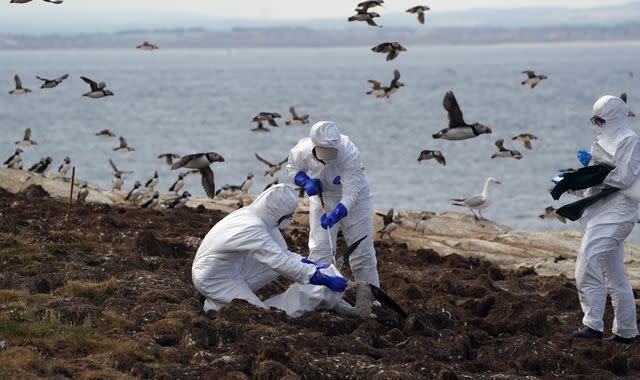Hope in fight against lethal bird flu as scientists discover some species developing immunity

Hopes of combatting a lethal strain of bird flu have received a small boost after scientists discovered some seabirds were developing immunity.
Amid the UK's worst outbreak on record, last year at least 3.4 million birds died or were culled and shops ran short on eggs.
A small number of bird flu infections in humans have also been detected since the current outbreak began in 2021.
In what they are calling a "significant" step forward, UK scientists believe - for the first time - they have found cases of seabirds that have had been exposed to the current H5N1 strain and then recovered.
In welcome news for farmers, the study also found long distance transmission from one farm to another was extremely unlikely.
The findings by the FluMap group of eight organisations, led by the Animal Plant Health Agency (APHA), are based on a "small sample size" of Northern gannets - a species particularly vulnerable to bird flu - and shag species.
Thousands of Gannets died at two key RSPB sites, Grassholm and Troup Head, with numbers falling to lows not seen since the 1960s.
Much fewer died this year - and the scientists discovered some birds that had been infected and survived. Infections can spread from wild to farmed birds, meaning tackling it in wild birds is important for protecting farms.
Professor Ian Brown from APHA said: "The data from flu map shows, not surprisingly, perhaps, that some of [the living birds tested this year] were indeed exposed, got infected and recovered and were therefore immune."
However there is still "lots of uncertainty" about the broader implications, he added.
Bird flu viruses can morph and change, meaning antibody levels will likely decline over time and so immunity may fade.
That means next year's offspring are not guaranteed to be immune, so scientists aren't expecting whole populations to benefit yet.
Prof Brown said the findings were "significant new data" but could not be described as a "major, major breakthrough"
"It gives us more insights to what's happening with the virus and its impacts on biodiversity," he added.
Read more:
How worried do humans need to be about bird flu?
Nearly 10,000 seabirds dead and sick across Scotland
Investigation into sewage spills near dolphin population
Scientists hope the findings will provide a better understanding of how the virus changes, helping them to control the spread and protect the health of animals and humans in future.
The UK's chief veterinary officer Christine Middlemiss said the Department for Environment Food and Rural Affairs (DEFRA) was in talks with industry figures about possible vaccinations for farmed birds.
DEFRA and the government-sponsored UK Research and Innovation (UKRI) have announced an extra £3.3m of funding for the group to find out more about immunity in wild birds.
Another group has also been given £3.2m to investigate the potential for human transmission.
According to DEFRA, 60% of new human diseases originate in animals.
Although current numbers of confirmed cases are lower than this time last year, Prof Middlemiss said there was still a "high risk" infections could spread, and urged farmers to maintain biosecurity measures.
An RSPB spokesperson said 2023 has seen the "third consecutive summer UK seabirds have been hit by this strain of bird flu, with tens of thousands of birds dead so far".
They welcomed the news about signs of immunity, but said it "does not change the fact that we need urgent conservation action to build resilience in our vulnerable seabird populations, so they can better recover from the impacts of this devastating disease".
Watch The Climate Show with Tom Heap on Saturday and Sunday at 3pm and 7.30pm on Sky News, on the Sky News website and app, and on YouTube and Twitter.
The show investigates how global warming is changing our landscape and highlights solutions to the crisis.

 Yahoo News
Yahoo News 
